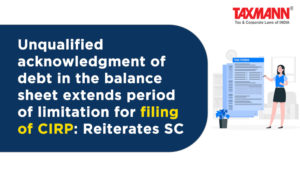Unqualified acknowledgment of debt in the balance sheet extends period of limitation for filing of CIRP: Reiterates SC
- News|Blog|Insolvency and Bankruptcy Code|
- 3 Min Read
- By Taxmann
- |
- Last Updated on 20 May, 2022

Case Details: State Bank of India v. Krishidhan Seeds Private Limited - [2022] 138 taxmann.com 326 (SC)
Judiciary and Counsel Details
-
- Dr. Dhananjaya Y. Chandrachud & Surya Kant, JJ.
Facts of the Case
In the instant case, the NCLT rejected an application filed by the State Bank of India (the ‘appellant’) u/s 7 of the IBC against the Corporate Debtor (‘the respondent’) initiating the Corporate Insolvency Resolution Process (CIRP).
The respondent had received credit facilities from the appellant. According to the appellant, the outstanding amount under the credit facility totalled to Rs 102.4 crores. In place of these credit facilities, the respondent (along with other persons) provided securities in favor of the appellant.
However, the respondent failed to honor the terms of credit facilities and defaulted on their repayments. Hence, the respondent’s account with the appellant was classified as a Non-Performing Asset on June 10, 2014.
Then, the appellant aimed to seek recourse at various junctures to the Securitisation and Reconstruction of Financial Assets and Enforcement of Security Interest Act 2002 and Recovery of Debts Due to Banks and Financial Institutions Act 1993, while continuing to engage in negotiations with the respondent.
Thereafter, a letter was issued by the respondent to the appellant dated January 19, 2016 offering a One Time Settlement of Rs 61 crores in lieu of its debts, which was conditionally accepted by the appellant. However, the respondent by a letter dated September 18, 2017 unilaterally revised the One Time Settlement to Rs 40.6 crores, which was refused by the appellant.
In addition to this, an application for initiation of the CIRP was filed by appellant on the ground that there was a default on the part of respondent in paying a financial debt in the amount of approximately Rs 189 crores (calculated along with an interest as on June 30, 2018).
While rejecting the application u/s 7 of the IBC on ground of limitation, the NCLT observed that the respondent’s loan account was declared to be an NPA on June 10, 2014 while the proceeding u/s 7 was instituted on September 19, 2018 i.e. beyond a period of three years from the date on which the right to apply accrued.
Referring to the decision given by NCLAT in case of “V Padmakumar v Stressed Assets Stabilisation Fund and Another”, the Appellate Tribunal held that a statement contained in the balance sheet cannot be treated as an acknowledgement of liability under Section 18 of the Limitation Act 1963 and the proposal for One Time Settlement which was submitted by the respondent on September 18, 2017 was also beyond three years from the date of default.
Supreme Court Held
The Supreme Court observed that an acknowledgement in a balance sheet without a qualification can be relied upon for the purpose of the proceedings under the IBC.
The Supreme Court held that unqualified acknowledgement of debt in Corporate Debtor’s balance sheet within a period of three years from the original date of default extends limitation for filing CIRP u/s. 7 of IBC, as section 238A of IBC makes section 18 of Limitation Act applicable to proceedings under IBC. Therefore:
(a) the provisions of Section 18 of the Limitation Act are not alien to and are applicable to proceedings under the IBC; and
(b) An acknowledgement in a balance sheet without a qualification can furnish a legitimate basis for determining as to whether the period of limitation would stand extended, so long as the acknowledgement was within a period of three years from the original date of default.
With the above clarification, the Supreme Court allowed the appeal and set aside the impugned judgment and order of the NCLAT and the NCLT.
Disclaimer: The content/information published on the website is only for general information of the user and shall not be construed as legal advice. While the Taxmann has exercised reasonable efforts to ensure the veracity of information/content published, Taxmann shall be under no liability in any manner whatsoever for incorrect information, if any.

Taxmann Publications has a dedicated in-house Research & Editorial Team. This team consists of a team of Chartered Accountants, Company Secretaries, and Lawyers. This team works under the guidance and supervision of editor-in-chief Mr Rakesh Bhargava.
The Research and Editorial Team is responsible for developing reliable and accurate content for the readers. The team follows the six-sigma approach to achieve the benchmark of zero error in its publications and research platforms. The team ensures that the following publication guidelines are thoroughly followed while developing the content:
- The statutory material is obtained only from the authorized and reliable sources
- All the latest developments in the judicial and legislative fields are covered
- Prepare the analytical write-ups on current, controversial, and important issues to help the readers to understand the concept and its implications
- Every content published by Taxmann is complete, accurate and lucid
- All evidence-based statements are supported with proper reference to Section, Circular No., Notification No. or citations
- The golden rules of grammar, style and consistency are thoroughly followed
- Font and size that’s easy to read and remain consistent across all imprint and digital publications are applied



 CA | CS | CMA
CA | CS | CMA
